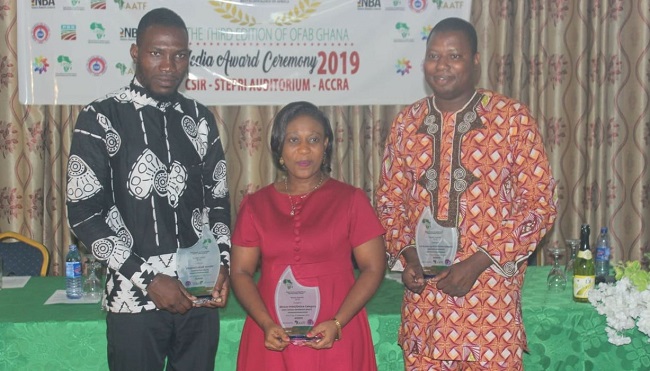While the role of the media as information disseminators in fostering development has never been in doubt, the range of media coverage of issues is sometimes a subject of debate. Some people are of the view that media reportage should cover all issues, but others think some issues are best left out of the media domain.

This debate has often resulted in media self-censorship, for fear of treading on wrong toes or unwillingness to get involved in the unknown or what they consider as controversial matters.
The latter was the reason why Ama Achiaa Amankwah Baafi never wanted to have anything to do with the subject of agricultural biotechnology. A journalist with the Graphic Business, Ama says: “Even though I report on agricultural issues, I never wanted to do agricultural biotechnology stories because I saw it as a controversial topic and did not want to be a part of the controversy.”
According to her, she later changed her mind after being assigned to do a report on the subject. “I realised as media, we needed to facilitate the conversation around the subject to make Ghana win.”
Ama was speaking after she was awarded the first prize in print and online category in the 3rd edition of the Open Forum on Agricultural Biotechnology (OFAB) Media Awards ceremony in Accra. The first runner up in the print and on-line category was Abubakar Ibrahim of Myjoyonline.com and the best radio report went to Salifu Wononou of Radio Wa. They received plaques, cash and hampers as their prizes.
OFAB, in collaboration with the Kenya-based African Agricultural Foundation (AATF), an NGO focused on agricultural biotechnology, instituted the awards scheme in 2017, to recognise journalists for their reportage on the contribution of biotechnology to food production and security.
Vice-President of the Ghana Journalists Association, Mrs. Linda Asante Agyei, congratulated the awardees for a good work and urged them not to relent in reporting on agricultural biotechnology. She explained that, that area required dedicated media coverage because agriculture, science and technology were integral parts of Ghana’s development agenda.
Therefore, she urged journalists to prioritise agricultural reporting, especially agricultural biotechnology because, “as journalists, it is our responsibility to educate and inform the public about issues, so they can make informed decisions and choices.” She also called on journalists to research well into stories to get their facts right before filing them, so that their audience will get a better understanding of issues.
The GJA Vice President noted that the need for thoroughness in journalistic research and reportage was very crucial, as media reportage impacted on the reputation of others. “Media practitioners have soiled the hard-earned reputation of some resource personnel and those damages could not be repaired,” she said.
Present at the ceremony were some of Ghana’s top scientists from the Council for Scientific and Industrial (CSIR) and the Ghana Atomic Energy Commission (GAEC).
They included the Director of the Biotechnology Nuclear Agricultural Research Institute (BNARI) of the Ghana Atomic Energy Commission (GAEC), Prof. Kenneth Danso, who briefed the gathering about the importance of biotechnology as a proven technology to address agricultural related problems. He said since the 1990s, his institute has been doing a lot of work on biotechnology, so by now the country should have reached the stage of commercialisation of crops.
Prof. Danso, who is also a member of OFAB Ghana Chapter, said: “It is unfortunate that in our part of the world, we have still not grasp the benefits of the technology,” adding, “the only way farmers can adopt the technology is to move the crops to the fields, so they can see the benefits for themselves.” He noted that journalists could foster the process by giving more time and space to agricultural biotechnology issues, so that the country could benefit.
A scientist and former Minister of State, Dr. Alhassan Yakubu, stressed the need for strong collaboration between journalists and scientists in order to position science in its proper place in the national development agenda.
He said, “It is science that has made the Eastern Tigers including Japan and Malaysia what they are today,” adding, “we need to make the debate on science more productive otherwise the gap between us and them will widen the more.”
For his part, the Director-General of the CSIR, Prof. Victor Kwame Agyeman, was unhappy with the award package given to the winners and said, “This as well as other media award packages depict that this country does not value journalism.” He elaborated: “Journalism is described as the fourth estate of a nation, and yet the situation of the Ghanaian journalist is that they live by the pen and die by the pen. But it is time for us to begin to value journalists.”
Prof. Agyeman called for a change in the nation’s value system to give credence to drivers of the national development who include journalists, so they will be better motivated and report better on issues including the products of Ghanaian scientists.”
A Senior Advisor to the Ghana Programme for Biosafety Systems (PBS), Prof. Walter Alhassan, was the Chairman for the occasion. He said media was key in the process of the uptake of agricultural biotechnology in the country, “therefore the subject should not be presented as a contentious issue, but as a tool for development.”
A Senior Research Scientist with CSIR’s Science Technology and Research Institute (CSIR STEPRI) and National Coordinator of OFAB Ghana, Dr. Richard Ampadu, said the award scheme has come to stay. In an interview, he urged the media to see agricultural biotechnology as one of the development issues in Ghana that requires their attention.
Dr. Ampadu explained that agricultural biotechnology should been seen from the perspective of addressing current challenges such as climate change, which is affecting the agricultural sector and threatening national food security.
By Ama Kudom-Agyemang
